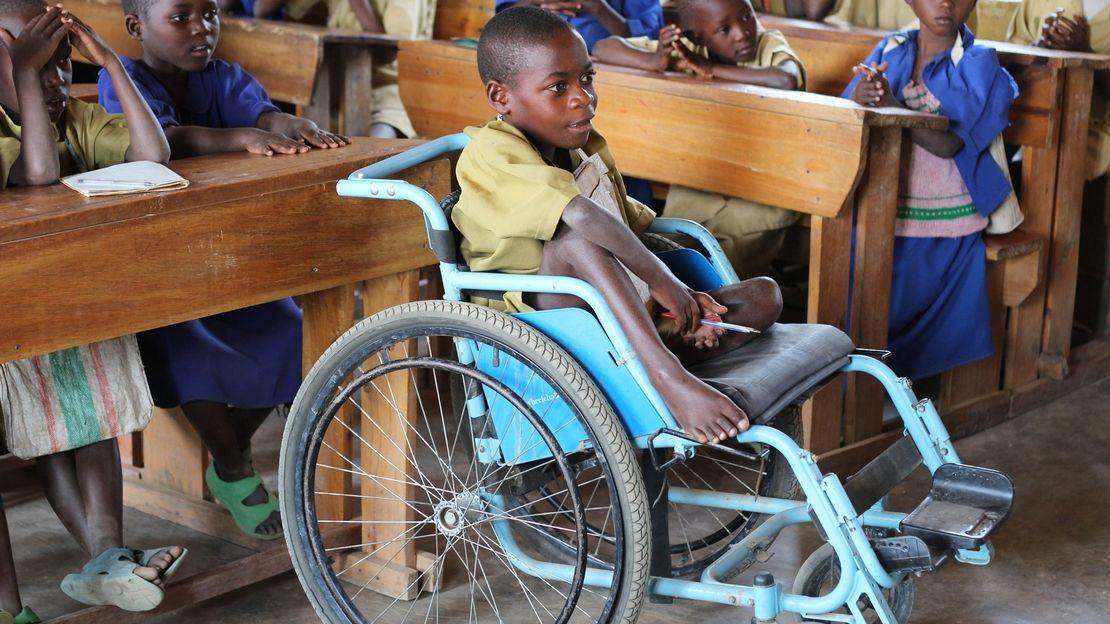The International Disability and Development Consortium (IDDC), the International Disability Alliance (IDA), the Global Action on Disability (GLAD) Network and the Global Campaign for Education (GCE), call for the international community to commit to ensuring disability inclusive quality education, including in early childhood, in global efforts to mobilise action ahead of the Transforming Education Summit (TES) in September.
We are calling on the TES Secretariat, UN Member States, civil society partners and other education actors to Leave No One Behind in delivering SDG4 and ensure that the rights of children and youth with disabilities are at the heart of the TES.
The challenge for children with disabilities
 Globally, 240 million children (one in ten) live with a disability, and they are more likely to be out-of-school compared to children without disabilities, especially girls with disabilities.
Globally, 240 million children (one in ten) live with a disability, and they are more likely to be out-of-school compared to children without disabilities, especially girls with disabilities.
 Pandemic-related school closures have led to lower-quality learning, increased exclusion, marginalisation and poverty for children with disabilities.
Pandemic-related school closures have led to lower-quality learning, increased exclusion, marginalisation and poverty for children with disabilities.
 Barriers to learning include social stigma, poverty, inadequate and inaccessible learning facilities, lack of reasonable accommodations and support services, and weak policy environments that do not align with the Convention on the Rights of Persons with Disabilities.
Barriers to learning include social stigma, poverty, inadequate and inaccessible learning facilities, lack of reasonable accommodations and support services, and weak policy environments that do not align with the Convention on the Rights of Persons with Disabilities.
TES Thematic Action Tracks
For the agenda to transform education, five Thematic Action Tracks have been defined:
1. Inclusive, equitable, safe and healthy schools
2. Teachers, teaching and the teaching profession
3. Learning and skills for life, work and sustainable development
4. Digital learning and transformation
5. Financing of education
Inclusion and equity are cross-cutting principles that must be applied across all areas of education systems. We recommend the following priorities to be recognised at the TES to ensure action towards more inclusive education systems for people with disabilities:
1. Inclusive, equitable, safe, and healthy schools
A twin track approach
 Transforming education systems requires a twin-track approach to disability inclusion that mainstreams disability and provides targeted support to those most at risk of exclusion
Transforming education systems requires a twin-track approach to disability inclusion that mainstreams disability and provides targeted support to those most at risk of exclusion
 Dismantle structures of discrimination, phase out segregated and/or special education settings and ensure the provision of inclusive education
Dismantle structures of discrimination, phase out segregated and/or special education settings and ensure the provision of inclusive education
Improve evidence and data
 Build capacity to disaggregate data by sex, age, disability, geography, and other intersecting dimensions
Build capacity to disaggregate data by sex, age, disability, geography, and other intersecting dimensions
 Develop evidence-based policies using reliable data by strengthening national data systems to increase the availability, quality, and comparability of data
Develop evidence-based policies using reliable data by strengthening national data systems to increase the availability, quality, and comparability of data
2. Teachers, teaching and the teaching profession
Invest in inclusive teacher training
 Increase investments towards pre- and in-service teacher training in disability inclusive pedagogy to ensure staff adapt practices to diverse learning needs.
Increase investments towards pre- and in-service teacher training in disability inclusive pedagogy to ensure staff adapt practices to diverse learning needs.
 Train education staff and include disability-inclusive approaches to distance-learning, through high, low and no- tech solutions.
Train education staff and include disability-inclusive approaches to distance-learning, through high, low and no- tech solutions.
3. Learning and skills for life, work, and sustainable development
Remove Institutional and interlinking barriers
 Apply an intersectional lens to policy making to identify factors of exclusion and inequality.
Apply an intersectional lens to policy making to identify factors of exclusion and inequality.
 Promote cultures of inclusion and implement inclusive policies from early childhood development through higher education and vocational training
Promote cultures of inclusion and implement inclusive policies from early childhood development through higher education and vocational training
4. Digital learning and transformation
Tackle the digital divide and ensure technology is accessible for all
 Education technology should include quality, accessible and affordable modes of digital and remote technologies
Education technology should include quality, accessible and affordable modes of digital and remote technologies
 Address gendered and ableist differences in access to digital learning through a disability-inclusive and gender-responsive approach to ICT development
Address gendered and ableist differences in access to digital learning through a disability-inclusive and gender-responsive approach to ICT development
5. Financing of education
Ensure adequate, sustainable and equitable funding
 National education budgets should be protected and increased to universally agreed benchmarks, with considerations of the costs required when budgeting for inclusion
National education budgets should be protected and increased to universally agreed benchmarks, with considerations of the costs required when budgeting for inclusion
 Embed the twin-track approach in education finance at the early stages of inclusive budgeting
Embed the twin-track approach in education finance at the early stages of inclusive budgeting
6. Engage people with disabilities
 Meaningfully engage with organisations of persons with disabilities (OPDs), teachers with disabilities, children and youth with disabilities and their families and networks in all stages of inclusive education design
Meaningfully engage with organisations of persons with disabilities (OPDs), teachers with disabilities, children and youth with disabilities and their families and networks in all stages of inclusive education design
The TES must ensure actions advance progress towards SDG 4 through inclusive COVID-19 recovery, resilient and inclusive education systems, equitable financing, and the removal of institutional and social barriers to inclusion so every child can benefit from quality education.


















